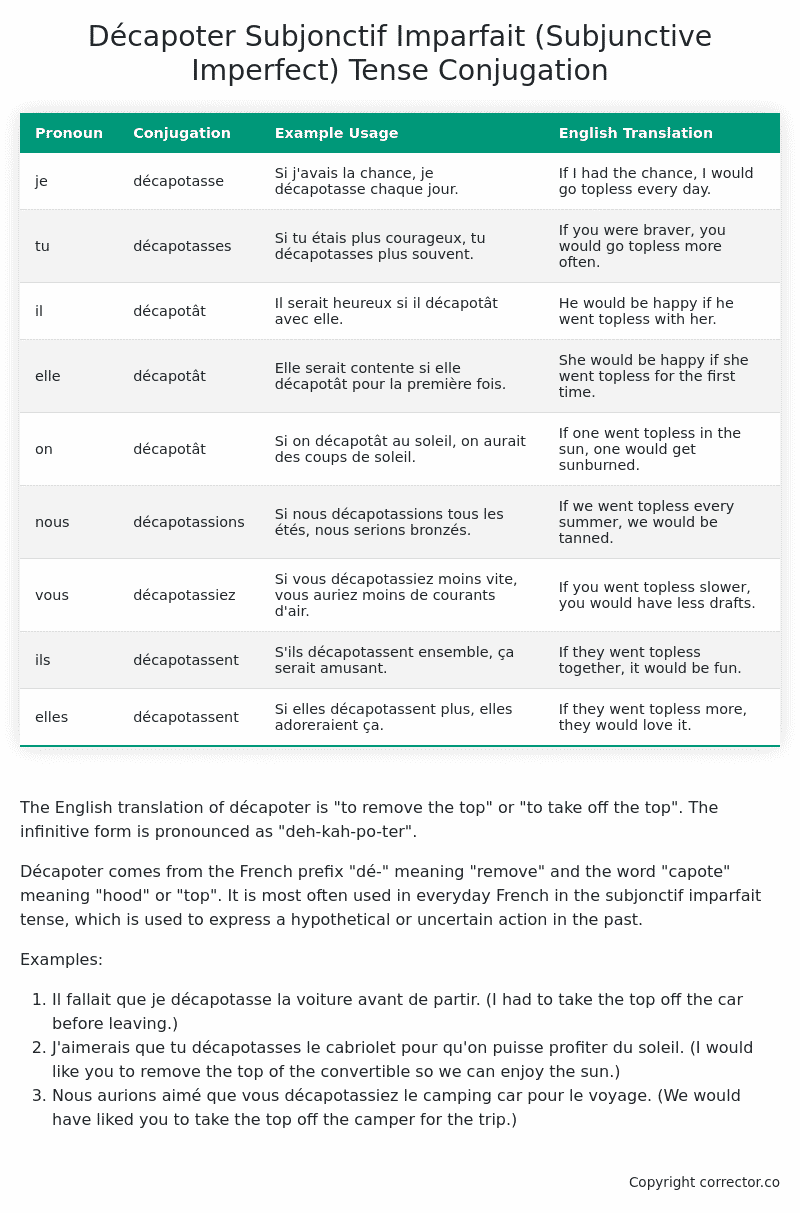Subjonctif Imparfait (Subjunctive Imperfect) Tense Conjugation of the French Verb décapoter
Introduction to the verb décapoter
The English translation of décapoter is “to remove the top” or “to take off the top”. The infinitive form is pronounced as “deh-kah-po-ter”.
Décapoter comes from the French prefix “dé-” meaning “remove” and the word “capote” meaning “hood” or “top”. It is most often used in everyday French in the subjonctif imparfait tense, which is used to express a hypothetical or uncertain action in the past.
Examples:
- Il fallait que je décapotasse la voiture avant de partir. (I had to take the top off the car before leaving.)
- J’aimerais que tu décapotasses le cabriolet pour qu’on puisse profiter du soleil. (I would like you to remove the top of the convertible so we can enjoy the sun.)
- Nous aurions aimé que vous décapotassiez le camping car pour le voyage. (We would have liked you to take the top off the camper for the trip.)
Table of the Subjonctif Imparfait (Subjunctive Imperfect) Tense Conjugation of décapoter
| Pronoun | Conjugation | Example Usage | English Translation |
|---|---|---|---|
| je | décapotasse | Si j’avais la chance, je décapotasse chaque jour. | If I had the chance, I would go topless every day. |
| tu | décapotasses | Si tu étais plus courageux, tu décapotasses plus souvent. | If you were braver, you would go topless more often. |
| il | décapotât | Il serait heureux si il décapotât avec elle. | He would be happy if he went topless with her. |
| elle | décapotât | Elle serait contente si elle décapotât pour la première fois. | She would be happy if she went topless for the first time. |
| on | décapotât | Si on décapotât au soleil, on aurait des coups de soleil. | If one went topless in the sun, one would get sunburned. |
| nous | décapotassions | Si nous décapotassions tous les étés, nous serions bronzés. | If we went topless every summer, we would be tanned. |
| vous | décapotassiez | Si vous décapotassiez moins vite, vous auriez moins de courants d’air. | If you went topless slower, you would have less drafts. |
| ils | décapotassent | S’ils décapotassent ensemble, ça serait amusant. | If they went topless together, it would be fun. |
| elles | décapotassent | Si elles décapotassent plus, elles adoreraient ça. | If they went topless more, they would love it. |
Other Conjugations for Décapoter.
Le Present (Present Tense) Conjugation of the French Verb décapoter
Imparfait (Imperfect) Tense Conjugation of the French Verb décapoter
Passé Simple (Simple Past) Tense Conjugation of the French Verb décapoter
Passé Composé (Present Perfect) Tense Conjugation of the French Verb décapoter
Futur Simple (Simple Future) Tense Conjugation of the French Verb décapoter
Futur Proche (Near Future) Tense Conjugation of the French Verb décapoter
Plus-que-parfait (Pluperfect) Tense Conjugation of the French Verb décapoter
Passé Antérieur (Past Anterior) Tense Conjugation of the French Verb décapoter
Futur Antérieur (Future Anterior) Tense Conjugation of the French Verb décapoter
Subjonctif Présent (Subjunctive Present) Tense Conjugation of the French Verb décapoter
Subjonctif Passé (Subjunctive Past) Tense Conjugation of the French Verb décapoter
Subjonctif Imparfait (Subjunctive Imperfect) Tense Conjugation of the French Verb décapoter (this article)
Subjonctif Plus-que-parfait (Subjunctive Pluperfect) Tense Conjugation of the French Verb décapoter
Conditionnel Présent (Conditional Present) Tense Conjugation of the French Verb décapoter
Conditionnel Passé (Conditional Past) Tense Conjugation of the French Verb décapoter
L’impératif Présent (Imperative Present) Tense Conjugation of the French Verb décapoter
L’infinitif Présent (Infinitive Present) Tense Conjugation of the French Verb décapoter
Struggling with French verbs or the language in general? Why not use our free French Grammar Checker – no registration required!
Get a FREE Download Study Sheet of this Conjugation 🔥
Simply right click the image below, click “save image” and get your free reference for the décapoter Subjonctif Imparfait tense conjugation!

Décapoter – About the French Subjonctif Imparfait (Subjunctive Imperfect) Tense
Formation
Common Everyday Usage Patterns
Interactions with Other Tenses
Subjonctif Présent
Indicatif Passé Composé
Conditional
Conditional Perfect
Summary
I hope you enjoyed this article on the verb décapoter. Still in a learning mood? Check out another TOTALLY random French verb conjugation!


